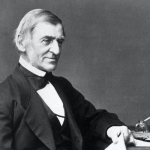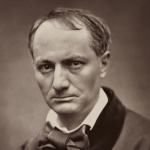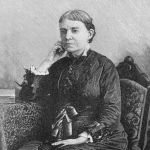Little thinks, in the field, yon red-cloaked clown,
Of thee from the hill-top looking down;
The heifer that lows in the upland farm,
Far-heard, lows not thine ear to charm;
The sexton, tolling his bell at noon,
Deems not that great Napoleon
Stops his horse, and lists with delight,
Whilst his files sweep round yon Alpine height;
Nor knowest thou what argument
Thy life to thy neighbor's creed has lent.
All are needed by each one;
Nothing is fair or good alone.
I thought the sparrow's note from heaven,
Singing at dawn on the alder bough;
I brought him home, in his nest, at even;
He sings the song, but it pleases not now,
He sang to my ear, — they sang to my eye.
The delicate shells lay on the shore;
The bubbles of the latest wave
Fresh pearls to their enamel gave;
And the bellowing of the savage sea
Greeted their safe escape to me.
I wiped away the weeds and foam,
I fetched my sea-born treasures home;
But the poor, unsightly, noisome things
Had left their beauty on the shore,
With the sun, and the sand, and the wild uproar.
The lover watched his graceful maid,
As 'mid the virgin train she stayed,
Nor knew her beauty's best attire
Was woven still by the snow-white choir.
At last she came to his hermitage,
Like the bird from the woodlands to the cage; —
The gay enchantment was undone,
A gentle wife, but fairy none.
Then I said, "I covet truth;
Beauty is unripe childhood's cheat;
I leave it behind with the games of youth:" —
As I spoke, beneath my feet
The ground-pine curled its pretty wreath,
Running over the club-moss burrs;
I inhaled the violet's breath;
Around me stood the oaks and firs;
Pine-cones and acorns lay on the ground;
Over me soared the eternal sky,
Full of light and of deity;
Again I saw, again I heard,
The rolling river, the morning bird; —
Beauty through my senses stole;
I yielded myself to the perfect whole.


















Comment form: